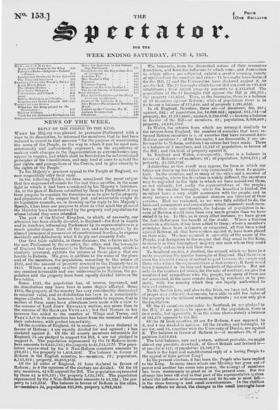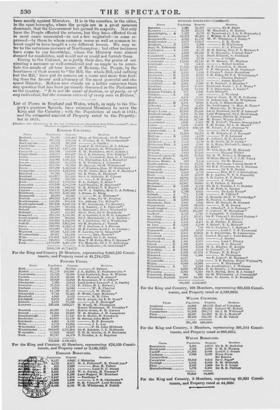NEWS OF THE WEEK.
REPLY OF THE PEOPLE TO THE KING.
'WHEN his Majesty was pleased to prorogue Parliament with a view to its dissolution, he informed the members, that he had been
induced to resort to that measure "for the purpose of ascertaining
the sense of the People, in the way in which it can be most con- stitutionally and authentically expressed, on the expediency of making, such changes in the Representation as circumstances may
:appear to require, and which shall be founded on the acknowledged principles of. the Constitution, and may tend at once to uphold the just rights and prerogatives of the Crown, and to give security to the rights of the People." :appear to require, and which shall be founded on the acknowledged principles of. the Constitution, and may tend at once to uphold the just rights and prerogatives of the Crown, and to give security to the rights of the People." To his Majesty's gracious appeal to the People of England, we -now respectfully offer their reply. In the following Tables, we have considered the great subject that has engrossed all minds for the last three months, in the same light in which it had been considered by his Majesty's- Ministers. As, in the plan of Reform submitted by them to Parliarrient, it was
their purpose to regulate the franchise so as to give to the property and population of the empire their just and reasonable weight in
its legislative councils, so, in drawing up the reply, to his Majesty's Speech, it has been our purpose to show in what spirit the plans of the MiniStrY have been received by the property and population for whose behoof they were intended. The part of the United Kingdom, to which, of necessity, our attention has been chiefly directed, is England—the first in wealth and in numbers, influencing Parliament by its representatives in a much greater degree than all the rest, and more capable, by its .almost immemorial possession of constitutional freedom, to express decidedly and deliberately what it deeply and sincerely feels.
Our first table exhibits, in three divisions, the returns made to the new Parliament by the counties, the cities, and the boroughs -of England that are favourabLi to Reform. The second, which is similarly arranged, exhibits the returns of those places that are hostile to Reform. We give, in addition to the name of the place and of the members, the population, according to the return of 1821, and the amount of property assessed to the Property-tax in 1815. Where a county or other place happens to have returned
one member favourable and one unfavourable to Reform, the po- pulation and the property have been equally divided between the two tables.
Since 1821, the population has, of course, increased, and its distribution may have been in sonic degree affected. Since 1615, the property of the, country has very considerably diminished
in nominal value, and its distribution has been in a considerable degree affected. It is, however, but reasonable to suppose, that in neither of these cases have alterations been made with a view to
the success of Lord JOHN RUSSELL'S motion, any more than to the success of Sir Rice/Lan VIIVY AN'S ; but that Nature in her increase has added to the number of Whigs and Tories, and PEEL'S Act in its contraction has taken from the nominal value of their substance, with perfect impartiality.
Of the counties of England, 49 in number, 35 have declared in favour of Reform; 4 are equally divided for and against ; 1 has declared against it. Of the 82 county members returnable for England, 76 are pledged to support the Bill, 6 are not pledged to support it. The . population represented by the 76 Reform mem-
bers amounts to 9,041,785.; the proPerty to 41,724,5771. The popu- lation repreiented by the 6 Non-Reform members amounts to 299,873 ; the property to 1,665,3641. The balance in favour of Reform in the English counties, is—members, 70; population,
8,741,912; properly, 40,059,213/. • • -
Of the 24 cities of England, 16 have declared in favour of Reform ; in 8 the opinions of the electors are divided. Of the 50 city members, 42 will support the:Bill. The population represented by these 42 is 676,535 ; the property 3,136,1971. The population represented by the 8 Non-Reformers amounts to 55,226 ; the pro- perty to 143,6341. The balance in favour of Reform in the cities, is—members 34, population 621,309, property 2,992,5631. The boroughs, from the diversified nature of their respective franchises, and from the influence to which some, and domination to which others arc subjec'ed, exhibit a greater seeming variety of opiniim than the counties and cities : 71 boroughs have declared for the Bill, 77 and the Universities have declared against it, 30 are divided. The 7 I boroughs which favour Reform contain 881,693 inhabitants ; their united property amounts to '2.333,092/. The population of the 77 boroughs that oppose the Bill is 306,035; the property 741,670/. Thus, in the boroughs, there is a balance of 19 members against Reform ; while of population there is in its favour a balance of 575,648, and of property 1,591,422/.
In all England, therefore, there are-eof members, for, 287; against, 202 ; of population, for, 10,600;063a against, 661,134—of property, for, 47,193,866/. ; against, 2,550,658/. ;—leaving a, balance in favour of the Bill—of members, 85 ; population; 9,938,869 ; property, 44,643,198/. In Wales, the returns from which are arranged similarly to the returns from England, the number of counties that have re- turned Reform members is 5, of counties that haVe returned Ant i- Rethrm members 7 ; of the boroughs, 8 are favourable, 3 are un- favourable to Reform, and from 1 no return has been made. Them is a balance of 3 members, and 15,342 of population, in favour of the Bill ; and 114,994). of property against it. In England and Wales, consequently, there is a balance in favour of Reform—of members, 88 ; of population, 9,954,211 ; of property, 44,5-29,204/. - Astounding as this result may appear, the form in which our tables are drawn up has taken very considerably from its .tuagni- tude. In the counties, and in many of the cities and a number of the boroughs, where the franchise is widely diffused, the members may be regarded in the light in which we have considered them, as not virtually, but really the representatives of the people; but in the smaller boroughs, where the franchise is limited, the members have a very slight connexion with the people, and in many instantos even the nominal electors are ignorant of their persons. Had we reckoned, as we were fully entitled to do, the lords and commoners and corporations which nominate such mem- bers, as their only conelituents, the balance of poptdation in fa- vour of Reform would have been very much greater than we have stated it to be. In this, as in every other instance, we have given the Anti-Reformers the benefit of the doubt. Where a fraction occurs in a division, it has been added to them ; where a member's principles have been wilinown or suspected, all that have voted againstaeainst Reform, all that have seoken against it, have been la on their side. We have counted it unworthy of the cause of the People, and derogatory to the respect that they owed to the Kw, to inchele in their triumphant majority one man whom they could not wholly and entirely call their own.
To Scotland apelies, fl fortiori, the remark which we hove just made respecting the smaller boroughs of Enoland. Had there been even the slie2hN2st feeling of mutual respect between the reople and those who return the representatives of that country, Reform would have triumphed in its tens and hundreds of thousands. But not only do the electors (of which, for the sake of contrast, we give the numbers) not sympathize with the people, but. many of them are not connected, in the most remote degree, by residence or by pro- perty, with the country which they are legally authorized to rule and outrage.
To the Scotch lists, and also to the Irish, we have not, for want of proper and authentic documents, been able to add the value of the property in the ditierent returning districts ; We can only give the population. Of time 43 members returnable by Scotland, 24 are pledged to
the 21 are pledged to oppose it; of the population, there is• (not really, but apparently, front the cause above stated) a balance of 104,270 opposed to the Biil. Of the 32 Irish comities, 22 are for Reform, 6 are opposed to it, and 4 are divided in opinion. Of the 33'cities and boroughs, IS are for, and 15, together with the University of Dublin, are against it. The balance in favour of Reform is—of members 36, of po- pulation 3,654,834. The total balance, sure and certain, without probable, we might alMost say possible, drawback, of Great Britain and Ireland is of me:nbeis 127; of population 13,504,775. Such is the loyal and constitutional reply of a loving People to the appeal of their patriot King! In the present election, it has been the People who have.replied to the. King. In many cases where one Ministry has gone out of power and another has come into power, the change of members has been numerically as great as in the present cases But the change hie been in that part of the representative syitem where the influence of Government and its friend.% is most ,felt— in the close borougies and small constituencies. • In the eleOion, whose effects we detail, the changes in the small befotighS -have
been mostly against Ministers. It is in the counties, in the cities, in the open boroughs, where the people are in a great measure dominant, that the Government has gained its majority. Not only have the People effected the returns, but they have effected them in most cases unassisted-in not a few neglected-in some re- pressed-by those to whom common sense as well as common in- terest ought to have taught a very different lesson. We may re• fer to the notorious instance of Northampton ; but other instances have come to our knowledge, where the Ministry were almost dunned for candidates, and would not or could not furnish them.
Giving to the Cabinet, as is justly their due, the praise of ori- ginating a measure so well considered and so ample as to conci- liate the minds of all true lovers of Reform, the People, by the heartiness of their assent to "the Bill, the whole Bill, and nothing but the Bill," have put its success on a surer and more firm foot- ing than the favour and advocacy of the most powerful and elo- quent Ministry. Reform now stands on a loftier eminence than any question that has been previously discussed in the Parliament or the country. "It is not the cause of faction, or of party, or if any individual, but the common interest of every man in Britain."



























